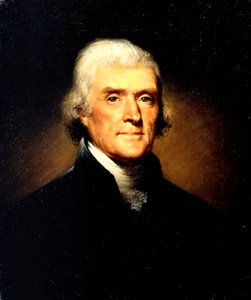
Leupp also compares Nepal’s revolutionaries to Thomas Jefferson:
To his death in 1826 Jefferson upheld the French Revolution.
Some might find in Jefferson callous disregard for human suffering, and hypocrisy in any talk of freedom by a Virginia slave-owner. But I see Jefferson as a humanist, about as sensitive and thoughtful a man as you might find among his class during his time. He was merely coupling a passionate commitment to a better world with a realistic understanding of what deeds flawed human beings might perform in its pursuit: “……rather than [the Revolution] should have failed, I would have seen half the earth desolated. Were there but an Adam and an Eve left in every country, and left free, it would be better than it now is.” Better a less populated world that is free, than a world populously unfree. Better revolution replete with errors and crimes than no revolution at all.
“The Oppressed Should Rebel”
What would Jefferson think of the revolutionaries of today, the serious, violent, bloody revolutionaries such as the Maoists in Nepal charged with the slaughter of innocents, vilified in the mainstream press and even in some of the alternative press? We can only speculate on the basis of his writings. In his “Notes on Religion” written in 1776, a Jacobin Jefferson wrote, “The oppressed should rebel, and they will continue to rebel and raise disturbance until their civil rights are fully restored to them and all partial distinctions, exclusions and incapacitations are removed.” His reference to restoration reflects the Enlightenment Deist belief that “Nature’s Law and Nature’s God” gives human beings rights at birth that governments sometimes take away. But he’s basically saying what Mao Zedong did three centuries later: “It’s right to rebel.” Mao declared “Revolution is not a dinner party.” Jefferson in 1790 noted, “We are not to expect to be translated from despotism to liberty in a feather-bed.”
When you decide that it’s necessary to violently destroy a state apparatus and build something else in its place, you’re probably, in Jefferson’s words, going to make errors and even commit crimes. Errors and crimes are always regrettable. But those committed by the oppressed seldom rival those committed by the oppressors. Today a single hyperpower, a law unto itself, violates the UN Charter, the Geneva Conventions and its own Constitution, and kills tens of thousands of civilians in order to establish an empire. It refuses to allow the World Court to try any of its citizens, and by its arbitrary “terrorist” designations targets many who really do challenge despotism and seek liberty.
About 11,000 people (fewer than have died at the hands of U.S. forces in either Afghanistan or Iraq since those countries were invaded) have died for reasons connected to the People’s War since the war began in Nepal in 1996. Many fault the Maoists for all the casualties, although the great majority of those slain have by all accounts been Maoists and civilians perceived as Maoist supporters by the security forces (Nepal Assessment 2003). What would Jefferson think of this attribution? Perhaps he would say, “We American patriots plus our German mercenaries lost over 8,000 in action in our Revolutionary War, plus 20,000 civilians dead, and killed hundreds of redcoats. Were all those deaths the fault of our rebellion, or the fault of the government that through its injustice impelled us to the separation? To a new sort of regime only possible to create through force of arms?”
What would that other eloquent voice of the American Revolution, Thomas Paine say? Paine, who denounced Edmund Burke’s “horrid paintings” of the French Revolution, and despite his own imprisonment for a time by the Jacobins (an example of error and excess) was always a great friend of the French Revolution, might say: “The rebellion in Nepal is a revolt in favor of Reason. It makes no sense for 72% of its people to live below the poverty line, many in conditions resembling medieval European feudalism. It makes no sense for the government to neglect the population and present the king as the incarnation of a god. It makes no sense for 60% of the development budget to come from abroad, or for the country to so lack job opportunities that 50,000 Nepali women have to work as prostitutes in Mumbai, India -- half the city’s total. It makes no sense for infant mortality to be 70 in 1000 because there’s just one doctor per 25,000 people, or for longevity to average 59 years, or for literacy to stand at 45% with only a third of girls getting any education. The revolution will quite likely change all this. The world is my country, all men my brothers, all women my sisters. So I reject the horrid depictions of it and yes, I support the truly terrific revolution in Nepal.”
Gary Leupp is a Professor of History, and Adjunct Professor of Comparative Religion, at Tufts University and author of numerous works on Japanese history. He can be reached at: gleupp@granite.tufts.edu.



No comments:
Post a Comment